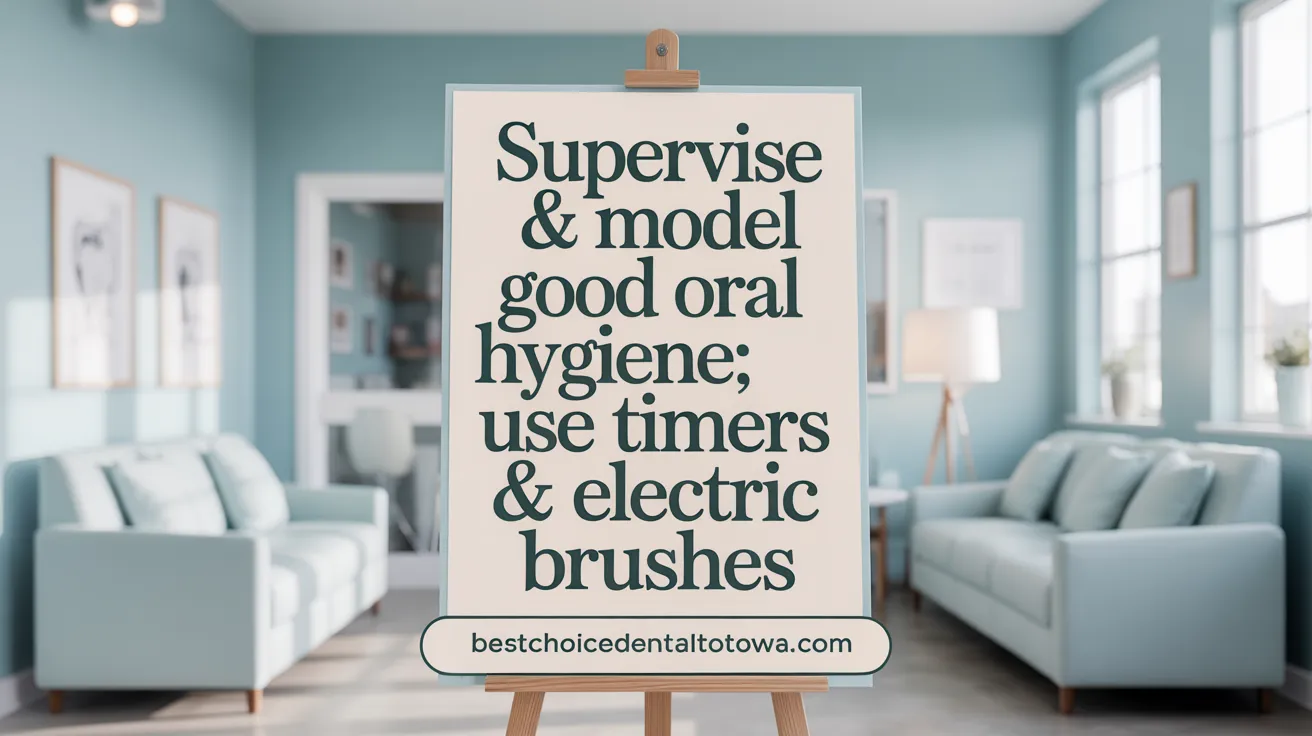Start Strong: Dental Care for Busy Families
Maintaining a healthy smile for the entire family can be challenging amid the hustle and bustle of daily life. Busy parents often juggle work, childcare, and household responsibilities, making it tough to keep everyone's dental health on track. However, simple, consistent habits and practical strategies can ensure that both children and adults enjoy strong teeth and gums. This article explores effective tips tailored to busy parents seeking to promote lifelong oral health for themselves and their children.
Establishing Consistent and Engaging Oral Hygiene Routines

How can busy parents establish consistent dental hygiene routines for their children?
Busy parents can successfully create consistent dental care habits by setting specific times for brushing and flossing twice daily. Integrating fun and engaging elements, such as electric toothbrushes with built-in timers or dental products featuring favorite characters, helps keep children interested. Parental participation is crucial — when parents brush alongside their children and supervise their technique, children learn proper habits more quickly and feel motivated.
What are some effective ways to make brushing and flossing enjoyable for kids?
Turning dental care into a playful family activity works well to encourage kids. Using flavored or colorful floss and employing reward systems like sticker charts makes flossing less of a chore. Apps designed for kids’ oral hygiene, fun songs timed to last two minutes, and colorful toothbrush designs all add excitement. These strategies help children associate oral hygiene with positive experiences, fostering lifelong habits. See Promoting good oral hygiene habits in children for more ideas.
Proper brushing and flossing techniques for children
Children should brush twice daily using a soft-bristled toothbrush angled at about 45 degrees toward the gumline with gentle circular motions on all tooth surfaces, including the tongue. Flossing once daily removes plaque and food debris between teeth where brushes can't reach. Parents need to supervise brushing and flossing until their child is around 7 or 8 years old to ensure effective cleaning and develop independence.
Parental modeling and supervision
Parents who consistently maintain their own oral hygiene set a powerful example. Brushing together as a family not only demonstrates good habits but also strengthens routines. Supervision ensures children use the correct techniques and brush for the full two minutes, supported by timers or apps when needed. Learn more about Oral Health for Busy Parents.
Use of timers and electric toothbrushes
Tools like electric toothbrushes with built-in timers ensure brushing lasts the recommended two minutes and often feature fun designs that appeal to children. Timers and interactive apps also encourage kids to brush adequately, turning a necessary task into an enjoyable game.
Diet and Hydration: Key Pillars for Healthy Teeth

How does diet affect children’s and families’ dental health?
Diet significantly influences dental health by affecting enamel strength and cavity formation. Sugary and acidic foods and beverages contribute to enamel erosion and foster plaque buildup, which can lead to cavities. Frequent intake of these can increase the risk of tooth decay. For more on limiting sugary and acidic foods and choosing healthy snacks.
Choosing healthy snacks rich in calcium, such as cheese, fruits, and vegetables, helps strengthen enamel and stimulates saliva production. Saliva acts to neutralize acids and clear leftover food particles, protecting teeth naturally. Learn about calcium-rich snacks and benefits of cheese for enamel.
Limiting the consumption of sticky sugary snacks and avoiding bottle feeding with juice or milk at bedtime reduces prolonged sugar exposure, especially in infants and young children, preventing early childhood cavities. For guidance, see avoiding sugary drinks and bottles at bedtime and preventing cavities with good oral hygiene.
What role does hydration play in maintaining oral hygiene?
Drinking sufficient water promotes saliva production, which is essential for washing away food debris and neutralizing harmful oral acids. This reduces the risk of bacterial growth and cavities. Learn more about encouraging hydration with water and importance of water consumption.
Substituting sugary drinks with water, particularly fluoridated tap water, offers added protection by strengthening enamel and minimizing decay risks. Encouraging children and family members to drink water regularly supports strong teeth and overall oral health. See details on fluoridated tap water and cavities and hydration for oral health.
Additional Tips for Families
- Choose calcium-rich foods: Incorporate dairy, leafy greens, and nuts to aid enamel remineralization. Explore balanced diet for dental health and calcium and phosphorus in dental care.
- Limit juice intake for children: Avoid giving juice to infants under 12 months and restrict amounts for older children. Refer to juice intake recommendations for infants and children.
- Promote water drinking habits: Use fun water bottles or flavored water with natural fruit slices to entice children. Learn more about making water appealing for children.
Focusing on balanced nutrition and hydration routines helps maintain healthy teeth for the whole family, reducing dental problems while supporting general well-being. For comprehensive family dental care routines, see family dental routine tips and oral health tips for busy parents.
Professional Dental Care: Scheduling and Benefits for Busy Families

Why are regular dental checkups essential for busy families?
Regular dental visits play a crucial role in maintaining oral health for both children and adults. These checkups allow for early detection and management of cavities, gum diseases, and other oral health problems before they progress into more serious conditions. Professional cleanings during these visits remove tartar deposits that regular brushing cannot eliminate. Preventive treatments such as fluoride applications strengthen tooth enamel, while dental sealants protect molars from decay, significantly reducing the risk of cavities. For busy families, finding dental offices that offer flexible scheduling, including evenings and weekends, makes it easier to maintain consistent care without disrupting busy routines (Dental care tips for busy parents, Balancing work and family dental health).
How can parents reduce dental anxiety in their children?
Dental anxiety can be a significant barrier to regular dental care for children. Parents can help reduce this by selecting pediatric dentists who specialize in creating a friendly, non-threatening environment tailored to children. Positive experiences start with early and familiar visits, sometimes including trial appointments to acquaint children with the dental setting. Some dental providers offer sedation options to ease discomfort during treatment. Encouraging family involvement in home dental hygiene and making dental care a shared, fun activity helps children view dental visits positively. Consistent routines combined with positive reinforcement also build lasting healthy attitudes towards oral care (Dental care tips for busy parents, Preventative dentistry tips, Pediatric dentistry overview, Dental care routines for busy parents).
Early dental visits starting by the first birthday
Establishing dental care early is key to long-term oral health. Dental organizations recommend scheduling a child's first dental visit within six months after the first tooth appears or by their first birthday. Early visits help monitor development, provide parental guidance on oral hygiene, and allow preventive treatments like fluoride varnish and educational support. This early start lays the foundation for regular dental care and helps children acclimate to dental visits, reducing anxiety and fostering cooperation (Early dental care tips for parents, Child dental care basics, Oral health tips for children, Pediatric dental school overview).
Flexible scheduling options support busy families
For families juggling multiple activities and commitments, dental offices that provide flexible hours—including evenings and weekends—offer vital support. This flexibility allows parents to schedule checkups at convenient times, reducing the chance of missed appointments and promoting regular care. Offices designed to make visits comfortable and less stressful, especially for children, further encourage attendance and adherence to dental health routines (Flexible dental office hours, Family-friendly dental care routine, Balancing work and family dental health.
Benefits of preventive treatments like fluoride and sealants
Preventive dental treatments are essential tools in protecting smiles. Fluoride treatments help strengthen enamel and can reverse early decay, while dental sealants provide a protective barrier on molars, preventing up to 80% of cavities in back teeth. These easy, pain-free procedures performed during dental visits significantly lower the incidence of decay and are especially beneficial for children. Incorporating these treatments into regular dental visits supports overall oral health, reduces future dental work, and keeps busy families on track with preventative care (Benefits of fluoride varnish and sealants, Preventative dental care advantages, Effective preventive dental care, Dental sealants for children).
Effective Home Care Techniques and Tools for Families
What are the best practices for home oral care for families?
Proper home oral care involves brushing teeth twice daily with fluoride toothpaste for at least two minutes. Use a soft-bristled toothbrush held at a 45-degree angle toward the gums, applying gentle circular motions to clean all tooth surfaces effectively. Flossing once daily is critical for removing plaque and food particles between teeth, areas unreachable by brushing alone. Additionally, using an antibacterial or fluoride mouthwash—preferably alcohol-free and age-appropriate—can provide extra protection against bacteria and plaque.
Cleaning the tongue is another important step that helps reduce the bacteria causing bad breath and supports overall oral health (source).
How can busy parents maintain oral hygiene while traveling or on the go?
Busy parents can maintain family oral hygiene by preparing a grab-and-go oral care kit containing essentials like a toothbrush, toothpaste, floss, and mouthwash. When brushing is not possible, rinsing the mouth with water after snacks helps reduce plaque buildup. Planning ahead and setting reminders to stick to brushing and flossing routines ensures consistent oral care even during hectic days or travel (source).
Toothbrush selection and replacement frequency
Select toothbrushes with soft bristles to protect gums and tooth enamel. For children, toothbrushes designed with easy handholds and fun designs encourage use (source. Replace toothbrushes every three to four months or sooner if the bristles are frayed or after illness to maintain cleaning effectiveness (source).
Parental supervision and involvement
Parents should supervise young children’s brushing and flossing until they develop proper technique, usually around age 6 to 8. Modeling good oral hygiene by brushing together can motivate children and establish lifelong habits (source).
Travel kits and on-the-go dental care
To simplify oral care outside the home, a travel kit containing a compact toothbrush, fluoride toothpaste, floss, and a small bottle of mouthwash is practical. This allows for quick and effective cleaning after meals or snacks during busy family outings or vacations (source).
Building Lifelong Habits Through Education and Family Involvement
How can parents foster lifelong dental hygiene habits for their children?
Starting dental care early is essential for establishing lifelong habits. Parents can begin by gently cleaning an infant’s gums with a damp cloth even before the first tooth appears. Once the first tooth erupts, brushing should start with a small, soft-bristled toothbrush and an appropriate amount of fluoride toothpaste. Consistent daily routines that include brushing twice for two minutes and flossing once a day set a strong foundation.
Parent modeling plays a vital role. Children often imitate behaviors, so when parents brush and floss regularly and show enthusiasm, it encourages children to do the same. Family brushing sessions, using electric toothbrushes with timers or fun designs, and involving children in choosing their dental products make the experience enjoyable and engaging.
Educational resources such as interactive books, apps, colorful toothbrushes, and dental programs designed for young children add interest and make oral hygiene lessons more memorable. Positive reinforcement through reward systems like sticker charts or small prizes keeps children motivated and proud of their efforts.
What signs should parents watch for to address dental issues early?
Parents should be vigilant about signs that may indicate dental problems. These include bleeding or swollen gums, bad breath, tooth sensitivity or pain, and visible spots or lesions on the teeth. Monitoring brushing effectiveness by checking if toothbrush bristles are frayed or if a child’s breath is fresh can help gauge oral hygiene quality.
Regular dental checkups are essential, as professionals can spot early cavities or gum issues that may not be visible at home. Timely dental visits ensure early intervention, preventing progression to more serious problems that require extensive treatment. Encouraging open communication with the dentist helps parents receive personalized guidance to care for their child's teeth and gums effectively.
Achieving Healthy Smiles for the Entire Family
By integrating simple, effective dental care strategies into busy family routines, parents can ensure both their children and themselves maintain optimal oral health. Consistency in brushing and flossing, mindful dietary choices, regular professional dental visits, proper home techniques, and fostering positive attitudes towards dental care all contribute to strong, healthy smiles. With thoughtful planning and encouragement, busy families can overcome common challenges and build lifelong habits that support overall well-being.
